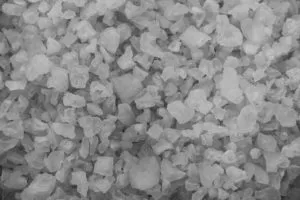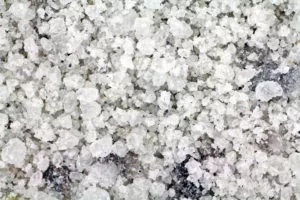Ice melt or rock salt?
Many homeowners use these terms interchangeably when describing bulk salt or driveway/sidewalk salt.
After all, ice melt or rock salt both accomplishes the same thing: Melting away tough ice and thick snow from your interlocking pavers.
So it doesn’t matter what you choose, right?
Actually, it does.
It all depends on what you need it for and where you plan on using it.
 All about ice melt
All about ice melt
The name of this product is pretty self-explanatory: Ice melt melts ice.
That’s because ice melt is usually comprised of one of the following:
- Calcium chloride (widely accepted as the most powerful and effective material)
- Magnesium chloride (less corrosive towards metal, concrete and plants)
- Potassium chloride (safe for green areas, but requires more product to work properly)
It’s actually pretty cool how ice melt works. When it’s really cold out and you spread it over an icy area, it actually lowers the freezing temperature of ice.
Sophisticated ice melt products form a brine-like deicing substance. By nature, brine generates heat and melts away the ice.
When ice melt reaches the surface of your interlock pavers, it begins to spread and breaks the bond the ice has with your driveway or walkway.
Choose ice melt if…
- Kids and/or pets won’t play or come near the surface you’re treating
- You own a commercial business and need to keep the parking lot clear of ice
- The temperature won’t drop below -25°C
- You need something that’s fast-acting
Want to know more about ice melt? Contact Lane’s Landscaping Supplies with your questions or comments.
 All about rock salt
All about rock salt
Another term for rock salt is sodium chloride (or Halite, if you want to use its geological name).
Rock salt is comprised of a variety of substances and materials:
- Grit
- Gravel
- Stones
Just like ice melt listed earlier in this blog, rock salt forms heat-generating brine which works to melt away ice.
The difference is the grit, gravel, and stones contained within the rock salt remain once the ice is gone. That’s by design, as it helps with traction.
Once the rock salt has done its job on your paving slabs, you’ll be able to walk (or move your car if you’re using it on your driveway) much safer and easier than before.
Choose rock salt if…
- You have plenty of steps to keep clear
- There’s no plant life nearby which could be exposed to it
- A car or other vehicle parked on the surface needs to be moved
- It won’t come into contact with trees, shrubs and grass
Want to know more about ice melt? Contact us with your questions or comments.
Ice melt or rock salt? Some other things to keep in mind
Either ice melt or rock salt will get the job done when it comes to getting rid of stubborn ice.
However, there are some other considerations you should think about when deciding what’s right for you:
- Rock salt is usually widely available. That also means that it’s subject to extreme shortages (especially if it’s a brutally cold and icy winter).
- Ice melt can work whether it’s sunny or cloudy outside (whereas rock salt needs the sun to really get going).
- Generally, ice melt costs more than rock salt. On the other hand, you’ll use less rock salt than ice melt when clearing your property.
Need ice melt or rock salt? Come to Lane’s
No matter if you’re a homeowner or contractor, or if you’re looking for ice melt or rock salt, Lane’s Landscape Supplies has you covered.
Contact us and ask for your FREE quote. We’ll get back to you ASAP with the information you’re looking for.


 All about rock salt
All about rock salt